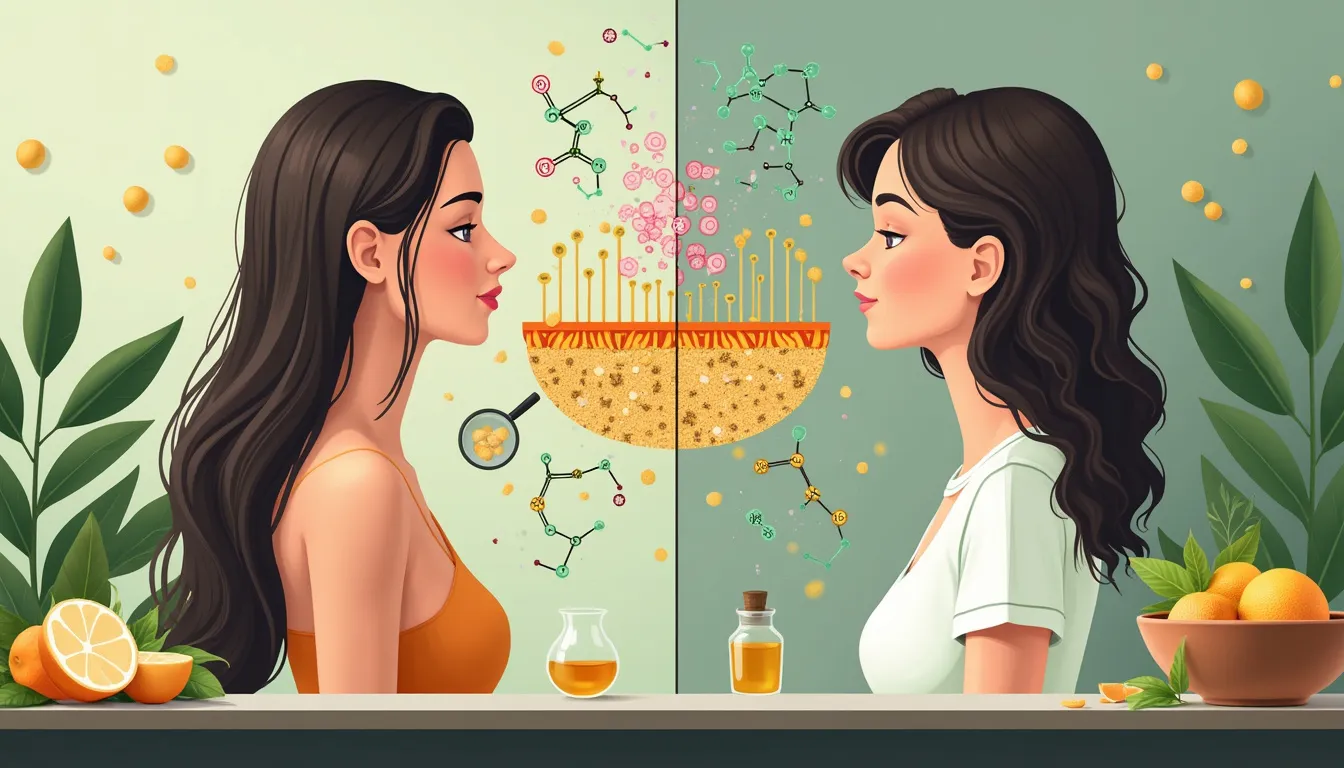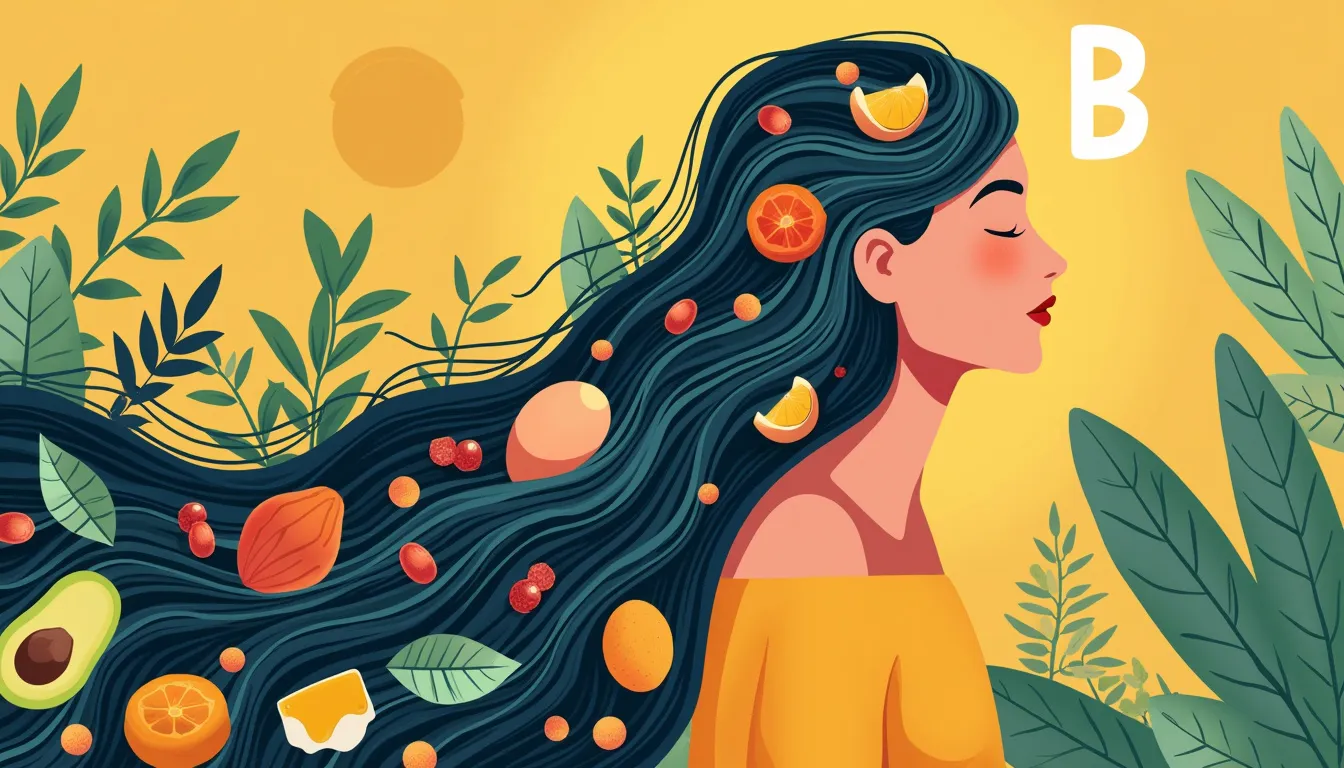Are you tired of lackluster locks and thinning hair? Discover the secret weapon that could revolutionize your hair care routine: biotin. This powerful vitamin, also known as vitamin B7, has been making waves in the beauty industry for its potential to boost hair growth and enhance overall hair health. Whether you’re dealing with hair loss, breakage, or simply want to achieve luscious, enviable tresses, biotin might be the missing piece in your hair care puzzle. In this comprehensive guide, we’ll delve into the world of biotin for hair growth, exploring its benefits, scientific backing, and practical ways to incorporate it into your daily life. From understanding the role of biotin in hair health to uncovering the latest research on its effectiveness, we’ll equip you with the knowledge you need to make informed decisions about your hair care regimen. Get ready to unlock the potential of biotin and take the first step towards achieving the healthy, vibrant hair you’ve always dreamed of.
Understanding Biotin and Its Role in Hair Health
What is Biotin and Its Natural Sources
Biotin, also known as vitamin B7 or vitamin H, is a water-soluble B-complex vitamin that plays a crucial role in maintaining healthy hair, skin, and nails. This essential nutrient has gained significant attention in recent years for its potential to promote hair growth and improve overall hair health. But what exactly is biotin, and where can we find it naturally?
Biotin is a coenzyme that helps our bodies metabolize fats, carbohydrates, and proteins. It’s involved in various biological processes, including the production of glucose and fatty acids. While our bodies can produce small amounts of biotin, we primarily rely on dietary sources to meet our daily requirements.
Fortunately, biotin is found in a wide range of foods, making it relatively easy to incorporate into our diets. Some of the best natural sources of biotin include:
- Egg yolks
- Nuts (especially almonds, peanuts, and walnuts)
- Seeds (such as sunflower seeds and chia seeds)
- Whole grains
- Legumes (like soybeans and lentils)
- Organ meats (liver, kidney)
- Salmon and other fatty fish
- Avocados
- Sweet potatoes
- Mushrooms
It’s worth noting that cooking can reduce the biotin content in foods, so consuming some of these items raw or lightly cooked can help maximize their biotin benefits.
How Biotin Supports Hair Growth and Strength
When it comes to hair health, biotin plays a vital role in several ways. First and foremost, it’s essential for the production of keratin, the primary protein that makes up our hair, skin, and nails. By supporting keratin production, biotin helps maintain the structure and strength of hair follicles, potentially reducing hair loss and promoting growth.
Here’s how biotin specifically contributes to hair growth and strength:
- Protein synthesis: Biotin aids in the metabolism of amino acids, which are the building blocks of protein. This process is crucial for creating the keratin needed for strong, healthy hair.
- Cell proliferation: Biotin helps stimulate cell division and growth, which is essential for hair follicle development and the production of new hair strands.
- Fatty acid production: The vitamin assists in the synthesis of fatty acids, which are necessary for maintaining a healthy scalp and providing nourishment to hair follicles.
- Improved nutrient absorption: Biotin enhances the body’s ability to absorb other nutrients important for hair health, such as vitamins B5 and B6.
While biotin deficiency is rare, individuals with low levels of this vitamin may experience hair thinning, brittle nails, and skin issues. Supplementing with biotin or increasing dietary intake can help address these concerns and support overall hair health.
Recommended Daily Intake for Optimal Results
The recommended daily intake of biotin varies depending on age, gender, and other factors. According to the National Institutes of Health (NIH), the adequate intake (AI) for biotin in adults is 30 micrograms (mcg) per day. However, it’s important to note that this is the minimum amount needed to prevent deficiency, and higher doses may be beneficial for hair growth.
Here’s a breakdown of the recommended biotin intake by age group:
- Infants (0-6 months): 5 mcg
- Infants (7-12 months): 6 mcg
- Children (1-3 years): 8 mcg
- Children (4-8 years): 12 mcg
- Children (9-13 years): 20 mcg
- Adolescents (14-18 years): 25 mcg
- Adults (19+ years): 30 mcg
- Pregnant women: 30 mcg
- Breastfeeding women: 35 mcg
For those specifically looking to boost hair growth, some studies have used higher doses of biotin, ranging from 2,500 to 5,000 mcg per day. However, it’s crucial to consult with a healthcare professional before starting any high-dose supplement regimen, as excessive biotin intake can interfere with certain laboratory tests and may cause side effects in some individuals.
It’s also worth noting that biotin is water-soluble, meaning that excess amounts are typically excreted through urine. This characteristic makes biotin toxicity rare, but it also emphasizes the importance of consistent intake for maintaining optimal levels in the body.
To achieve the best results for hair growth, consider combining biotin supplementation or increased dietary intake with other hair-healthy practices, such as:
- Maintaining a balanced diet rich in other essential nutrients like protein, iron, and vitamins A, C, and E
- Staying hydrated
- Avoiding harsh chemical treatments and excessive heat styling
- Managing stress through relaxation techniques or exercise
- Getting regular trims to prevent split ends and breakage
By understanding the role of biotin in hair health and incorporating it into a comprehensive hair care routine, you can take significant steps towards achieving stronger, healthier, and potentially faster-growing hair.

The Science Behind Biotin for Hair Growth
As we delve deeper into the world of biotin and its impact on hair health, it’s essential to explore the scientific evidence supporting its effectiveness. While anecdotal evidence has long suggested biotin’s benefits for hair growth, researchers have been working to provide concrete data to back up these claims.
Clinical Studies on Biotin’s Effectiveness
Several clinical studies have investigated the role of biotin in promoting hair growth and improving overall hair health. While more research is needed, existing studies have shown promising results:
- A 2015 study published in the Journal of Clinical and Aesthetic Dermatology found that women with self-perceived thinning hair experienced a significant increase in hair growth after taking a biotin-containing oral supplement for 90 days.
- Another study from 2017, published in Skin Appendage Disorders, reported that biotin supplementation improved hair growth in patients with temporary hair thinning.
- A 2018 review in Dermatology and Therapy concluded that biotin supplementation could be beneficial for hair growth, especially in individuals with underlying biotin deficiency.
While these studies offer encouraging results, it’s important to note that more extensive, long-term research is still needed to fully understand the extent of biotin’s effects on hair growth across diverse populations.
Biotin’s Impact on Keratin Production
One of the key ways biotin supports hair growth is through its role in keratin production. Keratin is a protein that forms the main structural component of hair, nails, and skin. Here’s how biotin influences keratin production:
- Protein Synthesis: Biotin acts as a coenzyme for carboxylases, enzymes that are crucial for the metabolism of proteins, fats, and carbohydrates. This process is essential for the production of amino acids, which are the building blocks of keratin.
- Cell Energy: Biotin helps convert nutrients into energy at the cellular level, providing the necessary fuel for keratin-producing cells to function optimally.
- Gene Regulation: Research suggests that biotin may play a role in regulating genes involved in keratin production, potentially influencing the quality and quantity of keratin produced.
By supporting keratin production, biotin helps create stronger, more resilient hair strands that are less prone to breakage and damage. This can contribute to the appearance of thicker, fuller hair over time.
Other Hair-Related Benefits of Biotin Supplementation
Beyond its impact on keratin production and hair growth, biotin offers several other benefits for hair health:
- Scalp Health: Biotin may help improve the overall health of the scalp by supporting the production of fatty acids. A healthy scalp provides a better environment for hair growth and can reduce issues like dandruff and dryness.
- Hair Elasticity: Some studies suggest that biotin can improve hair elasticity, making it less prone to breakage and split ends. This can contribute to the appearance of longer, healthier hair.
- Nutrient Absorption: Biotin plays a role in the metabolism of nutrients like folic acid, amino acids, and vitamin B12. Improved absorption of these nutrients can indirectly support hair health and growth.
- Reduced Hair Loss: While biotin isn’t a cure for hair loss, some research indicates that it may help slow down hair loss in individuals with specific deficiencies or conditions.
It’s worth noting that while biotin supplementation can be beneficial for many people, its effects may be more pronounced in individuals with underlying biotin deficiencies. For those with adequate biotin levels, the benefits might be less noticeable but can still contribute to overall hair health.
As with any supplement, it’s essential to consult with a healthcare professional before starting a biotin regimen, especially if you have pre-existing health conditions or are taking other medications. They can help determine the appropriate dosage and ensure that biotin supplementation is safe and effective for your individual needs.
For those looking to explore comprehensive hair loss solutions beyond biotin supplementation, consider checking out the Fortify program. This innovative approach combines multiple strategies to help combat hair loss and promote healthy hair growth.
In conclusion, while the science behind biotin for hair growth is promising, it’s important to approach it as part of a holistic hair care strategy. Combining biotin supplementation with a balanced diet, proper hair care practices, and other proven hair growth techniques can help you achieve the best results in your journey towards healthier, fuller hair.

Incorporating Biotin into Your Hair Care Routine
Now that we understand the science behind biotin and its potential benefits for hair growth, let’s explore how to effectively incorporate this essential vitamin into your daily hair care routine. By combining biotin supplements, biotin-rich foods, and other hair growth strategies, you can create a comprehensive approach to boost your hair health and promote luscious locks.
Biotin Supplements: Types and Dosages
One of the most popular ways to increase biotin intake is through supplements. These come in various forms, each with its own advantages:
- Tablets and Capsules: The most common and convenient form of biotin supplements. They’re easy to take and often combined with other vitamins for hair health.
- Gummies: A tasty alternative to traditional pills, especially appealing to those who struggle with swallowing tablets.
- Liquid Biotin: Offers faster absorption and is ideal for those who prefer not to take pills.
- Topical Biotin: Found in some shampoos and hair treatments, although its effectiveness compared to oral supplements is still debated.
When it comes to dosage, the recommended daily intake of biotin for adults is 30 micrograms (mcg). However, many hair growth supplements contain much higher doses, ranging from 1,000 to 10,000 mcg. While biotin is generally considered safe even at higher doses, it’s always best to consult with a healthcare professional before starting any new supplement regimen.
It’s worth noting that the U.S. Food and Drug Administration (FDA) doesn’t regulate dietary supplements as strictly as medications. Therefore, it’s crucial to choose reputable brands and look for products that have been third-party tested for quality and purity.
Biotin-Rich Foods to Include in Your Diet
While supplements can be beneficial, incorporating biotin-rich foods into your diet is a natural and wholesome way to boost your intake. Here are some excellent dietary sources of biotin:
- Eggs: Particularly egg yolks, which are one of the richest sources of biotin.
- Nuts and Seeds: Almonds, peanuts, walnuts, and sunflower seeds are all good sources.
- Organ Meats: Liver and kidney are exceptionally high in biotin.
- Salmon: Not only rich in biotin but also provides omega-3 fatty acids, which are great for hair health.
- Sweet Potatoes: A delicious and nutritious source of biotin.
- Avocados: Packed with biotin and healthy fats.
- Mushrooms: Especially cremini and portobello varieties.
- Legumes: Soybeans, peanuts, and lentils are all good plant-based sources.
By incorporating these foods into your meals, you’re not only increasing your biotin intake but also providing your body with a range of other nutrients beneficial for overall health and hair growth.
Combining Biotin with Other Hair Growth Strategies for Best Results
While biotin can be a powerful ally in your quest for healthier hair, it’s most effective when used as part of a comprehensive hair care strategy. Here are some complementary approaches to consider:
- Scalp Care: A healthy scalp is crucial for hair growth. Use gentle, sulfate-free shampoos and consider scalp massages to improve blood circulation.
- Balanced Diet: In addition to biotin-rich foods, ensure you’re getting enough protein, iron, and other essential nutrients for hair health.
- Hydration: Drink plenty of water to keep your hair and scalp hydrated from the inside out.
- Stress Management: High stress levels can contribute to hair loss, so incorporate stress-reduction techniques like meditation or yoga into your routine.
- Gentle Hair Care: Avoid harsh treatments, excessive heat styling, and tight hairstyles that can damage your hair and impede growth.
- Other Supplements: Consider combining biotin with other hair-supporting nutrients like vitamin D, iron, and omega-3 fatty acids. Always consult with a healthcare provider before starting any new supplement regimen.
- Regular Trims: While it might seem counterintuitive, regular trims can prevent split ends and breakage, promoting overall healthier hair growth.
- Topical Treatments: Some people find success with topical treatments like minoxidil, which can be used alongside biotin supplementation. Again, consult with a healthcare professional before combining treatments.
Remember, patience is key when it comes to hair growth. It typically takes several months to see noticeable results from any hair growth strategy, including biotin supplementation. Consistency in your routine is crucial for achieving the best outcomes.
For those looking for an all-encompassing approach to hair health, consider checking out this comprehensive hair loss prevention program. It combines multiple strategies, including nutrition and supplement advice, to help you achieve your hair growth goals.
By integrating biotin into a well-rounded hair care routine, you’re giving your hair the best chance to grow strong, healthy, and vibrant. Remember, what works best can vary from person to person, so don’t be afraid to experiment and find the combination that works best for you and your unique hair needs.
In conclusion, biotin has emerged as a powerful ally in the quest for healthier, stronger, and more vibrant hair. This essential B-vitamin plays a crucial role in supporting hair growth and strength by aiding in the production of keratin, the protein that forms the building blocks of our hair. While the body naturally produces biotin, supplementation and dietary adjustments can help ensure optimal levels for those seeking to enhance their hair health.
The scientific evidence supporting biotin’s effectiveness in promoting hair growth is compelling, with numerous studies demonstrating its positive impact on hair thickness, strength, and overall appearance. By stimulating keratin production and supporting the hair follicle’s metabolic processes, biotin helps create an ideal environment for robust hair growth.
Incorporating biotin into your hair care routine can be achieved through various methods. Biotin supplements are widely available and can be an effective way to boost your intake, especially for those with deficiencies. However, it’s essential to consult with a healthcare professional before starting any new supplement regimen. Additionally, focusing on biotin-rich foods such as eggs, nuts, seeds, and certain vegetables can naturally increase your biotin levels through your diet.
For optimal results, combining biotin supplementation with other proven hair growth strategies can create a comprehensive approach to hair health. This may include using topical treatments, maintaining a balanced diet rich in other essential nutrients, and adopting proper hair care practices.
Remember that while biotin can be a game-changer for many, individual results may vary. Consistency and patience are key when embarking on any hair growth journey. It’s also important to address any underlying health issues that may be contributing to hair loss or thinning.
As you explore the benefits of biotin for hair growth, consider complementing your efforts with a holistic approach to hair care. For those seeking additional support in their hair growth journey, programs like the one offered at hairsecurity.net/fortify can provide valuable resources and guidance.
Ultimately, biotin represents a promising and accessible option for those looking to enhance their hair health naturally. By understanding its benefits, incorporating it into your routine, and combining it with other hair-supportive practices, you can take significant steps towards achieving the luscious, healthy hair you desire.
